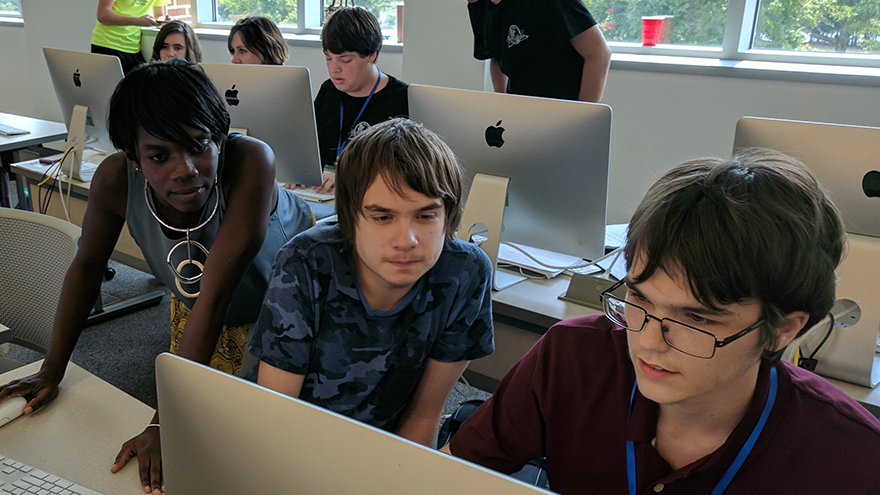GenCyber Camp Enhances Cybersecurity Awareness
July 30, 2017 | Center for Cybersecurity | cybersecurity@uwf.edu

Asked to summarize what he learned at the week-long University of West Florida Center for Cybersecurity GenCyber Camp, West Florida High School sophomore Andrew Thompson rattled off password protection, detecting suspicious emails and how to use the Linux operating system among others.
“I wasn’t expecting a whole lot to be honest, but I really did like it,” Thompson said. “It was a lot of fun. I wouldn’t change a thing about it.”
In July, the University of West Florida Center for Cybersecurity hosted the only two National Security Agency / National Science Foundation Program funded GenCyber camps in Florida. Each week-long camp targeted high school students and teachers to increase interest in cybersecurity careers and workforce diversity, enhance cybersecurity awareness and improve cybersecurity content and teaching methods for high school curricula.
Students and teachers learned about the Cybersecurity First Principles, career opportunities in the region and networked with cybersecurity experts through engaging curricula and hands-on activities such as a scavenger hunt, NSA Day of Cyber and a private-eye program.
“Our GenCyber camps provide an opportunity for high school students and teachers to learn about Cybersecurity principles and career opportunities through hands-on learning and mentoring from cybersecurity faculty and professionals,” said Dr. Eman El-Sheikh, UWF Center for Cybersecurity director. “We hope that the experience inspires them to pursue cybersecurity educational opportunities at UWF and a career in our region’s growing cybersecurity community.”
UWF Center for Cybersecurity faculty, Anthony Pinto and Dustin Mink, and undergraduate student members of the UWF Cyber Club mentored camp participants. The hands-on training at the camp impressed Gulf Breeze High School junior Noah Zalar.
“I usually don’t like going to camps, but I actually enjoy this camp,” Zalar said. “Rather than just listening, you actually get to work on what you learn.”
Diana Hanks, a 2017 Pace High School graduate and incoming UWF freshman, cited learning code and applying the skills she learned in activities among the highlights of the camp.
Florida Virtual School sophomore Nicholas Baston said he benefited on Day 3 of the first camp from hearing a panel of experts offer their insights.
Edward Hart, Cigna information security automation consultant, Russ Holloway, lead information security engineer at Navy Federal Credit Union, NSA GenCyber Manager Tina Ladabouche and Tom Skinner, Northrop Grumman cyber solutions division deputy program manager, advised students to develop communication skills and learn to speak cyber language if they plan to pursue careers in cybersecurity.
Holloway and Ladabouche warned campers to be careful when posting material online.
“Everything you post is always online,” Ladabouche said.
“Online presence is like a big billboard,” Holloway added.
Holloway said what cybersecurity students learn now will in all probability be obsolete in two years, but the capacity to learn will pay dividends throughout their careers. Holloway touched on the challenges sophisticated hackers present Navy Federal Credit Union.
“We’re seeing such a high spike in attacks,” he said. “It’s all day, every day. We have a security operations center that is 24/7.”
Participants at the second camp heard from a panel that included Marine Corps Lt. Col. Warren Dickey, Jeremy Emerson, a cyber systems administrator at Northrop Grumman, Hixardt Technologies CEO and President Mike Hicks Jr. and GBSI Founder and CEO Randy Ramos.
Hicks put the earning potential for a cybersecurity professional in perspective when he said a UWF grad started at his company as an intern making $8 an hour. That same employee now earns $90,000 annually.
Ramos advised students to build up their fundamental skill-sets by concentrating on operating systems, programming languages, databases and networks.
Students asked the panel what steps the panelists took to be in administrative roles.
“The best way I’ve found to lead people is by empowering people,” Emerson said.
Escambia High junior Robert Schoonover said his cybersecurity knowledge grew exponentially from listening to the panel and participating in the camp activities.
“I’ve learned a lot of stuff I didn’t know before and learned to protect myself from cyber attacks,” Schoonover said. “It took me off guard how easy it is to hack. I was like, wow, that’s how people do this. It doesn’t take much effort.”
Local students and teachers attended the camp with one exception. Ethan Dickey, the son of Lt. Col. Warren Dickey, traveled from the Tampa area for the camp. The high school senior returned to UWF after touring the campus two months earlier.
“I wanted to visit UWF again, especially since they specialize in what I like to do,” Dickey said of cybersecurity.
Students and teachers learned separately in the morning but then paired up in the afternoon sessions. Teachers utilized their morning training to assist students with activities.
Teachers received a set of curricular materials and resources to integrate cybersecurity into their classes. They spent their final day of the camp presenting 10- to 15-minute lesson plans to their colleagues. The lesson plans ranged from password protection to how to detect phishing.
“I have learned so much. It’s good to be working with students and teachers,” said Bellview Middle School teacher Tia King, a computer fundamentals teacher. “All of the (teacher assistants) and instructors were wonderful about explaining things to us.”







